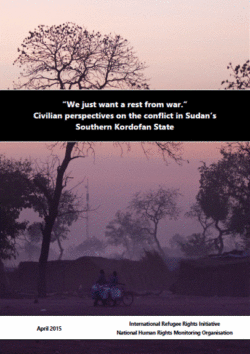“We just want a rest from war.” Civilian perspectives on the conflict in Sudan’s Southern Kordofan State
Published: 16 Apr 2015
Download the report
 The ongoing conflict in Sudan’s Southern Kordofan (SK) and Blue Nile (BN) states, while massively underreported, has had devastating consequences. Widespread aerial bombardment of rebel held civilian areas by the government of Sudan (GoS) are a hallmark of the conflict, and more than 3,000 bombs – on average three a day – have fallen since April 2012.2 Monitoring on the ground has shown that bombings coincide disproportionately with planting and harvesting cycles, as well as market days, suggesting a deliberate plan to decimate the local economy. Despite its disruption of agricultural production and access to markets, the GoS refuses to allow humanitarian access to these
The ongoing conflict in Sudan’s Southern Kordofan (SK) and Blue Nile (BN) states, while massively underreported, has had devastating consequences. Widespread aerial bombardment of rebel held civilian areas by the government of Sudan (GoS) are a hallmark of the conflict, and more than 3,000 bombs – on average three a day – have fallen since April 2012.2 Monitoring on the ground has shown that bombings coincide disproportionately with planting and harvesting cycles, as well as market days, suggesting a deliberate plan to decimate the local economy. Despite its disruption of agricultural production and access to markets, the GoS refuses to allow humanitarian access to these
areas, citing fears that such aid would be used to support rebel fighters. With increasing numbers being displaced from their homes, and humanitarian access all but cut off, the ability to survive grows more precarious by the day. As a result, 1.7 million people – roughly half of the population of the two states – have been displaced, and food insecurity has reached crisis levels for many of those who remain.
Living with the daily threat of aerial bombardment, of GoS land forces breaking through the rebel Sudan Peoples’ Liberation Movement–North (SPLM-N) frontline, and a chronic lack of food and medicine, the resilience of this population is being severely depleted. Meanwhile the international community remains, for the most part, silent.
This report highlights the voices of those civilians living in the midst of this conflict. Based on 52 qualitative interviews in three counties in the rebel held areas of SK, and building on the findings of a trusted team of human rights monitors who have been working to monitor the impact of the conflict on civilians since the current round of conflict started in June 2011, the report highlights both the devastating impact of the conflict on every aspect of people’s lives, as well as the resilience and resistance of the civilian population who are living through it.